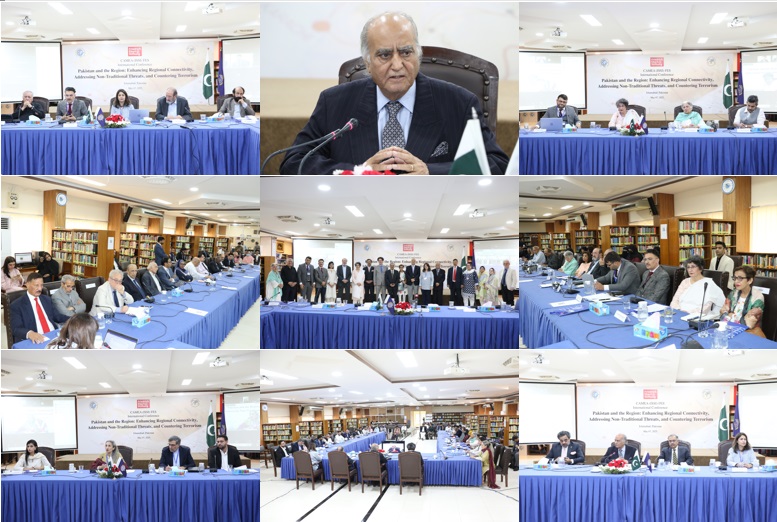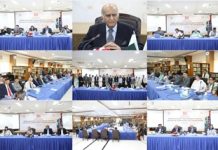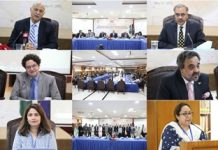ISSI International Conference on ‘Pakistan and the Region’ concludes
{Working Sessions}

The Centre for Afghanistan, Middle East and Africa (CAMEA) at the Institute of Strategic Studies Islamabad (ISSI), in collaboration with the Friedrich Ebert Stiftung (FES), Pakistan office, hosted a one-day international conference titled “Pakistan and the Region: Enhancing Regional Connectivity, Addressing Non-Traditional Threats, and Countering Terrorism.” Senator Mushahid Hussain Sayed was the Chief Guest at the inaugural session.
The conference featured three working sessions. The first working session, titled ‘Pakistan-Afghanistan Relations: Challenges and Opportunities’, was moderated by Director CAMEA, Ms. Amina Khan. The speakers of the session included: Ambassador Qazi Humayun, Pakistan’s Former Ambassador to Afghanistan; Mr. Hameed Hakimi, Afghanistan Research and Policy Initiative (ARPI), CHS, Doha; Ambassador Ayaz Wazir, Former Pakistani Ambassador; Mr. Zalmai Nishat, Founder and Executive Chair, Mosaic Foundation, UK; Mr. Tahir Khan, Journalist;and Mr. Muzammil Shinwari, Former Afghan Minister.
Speakers discussed key challenges in Pakistan Afghanistan-relations, including the TTP threat, India’s role, the Taliban’s position on cross-border terrorism, and return of refugees. Notwithstanding historical differences, they called for pragmatic, people-centric engagement, emphasizing soft power, and people-to-people ties. Some urged formal recognition of the Taliban to enable peaceful dispute resolution, enhanced trade, and shared resource use. An inclusive Afghan government was seen as essential, alongside a cooperative approach to dealing with the challenge of TTP and equal engagement with the Taliban. Projects like TAPI and CASA-1000 were highlighted as key opportunities for regional connectivity and a comprehensive trade agreement was proposed to unlock bilateral economic potential.
The second Working Session, titled “Regional Security and Countering Terrorism: Evolving Threats and Response Strategies”, was moderated by former Ambassador Seema Illahi Baloch. Speakers of the session included: Dr. Rustum Azizi, Research Director at “Tahlil,” Tajikistan; Dr. Foad Izadi, Head of the American Studies Department at the University of Tehran, Iran; Ambassador Riffat Masood, Former Pakistan Ambassador to Iran; Dr. Murat Aslan, Professor at Hasan Kalyoncu University and SETA Senior Researcher, Turkiye; and Mr. Zeeshan Salahuddin, Director Tabadlab.
Speakers stressed the urgent need for regional collaboration to address evolving security threats, noting that while the Taliban are no longer seen as a direct threat to Central Asia, groups like ISIS-K pose growing risks through local recruitment. Outdated threat narratives have bred public mistrust, demanding reassessment amid rising terrorism, militant fragmentation, and transnational issues like water insecurity. Regional connectivity and stability, they emphasised, rely on addressing both traditional and non-traditional security threats, strengthening internal cohesion, and engaging pragmatically with neighbours. True integration requires bold leadership, mutual trust, and a long-term commitment to peace, development, and regional ownership.
The third Working Session was moderated by Dr. Salma Malik, Associate Professor at Defence and Strategic Studies Department, Quaid-i-Azam University, focused on “Addressing Non-Traditional Security Threats: Climate Change and Humanitarian Challenges.” Speakers included: Mr. Ye Hailin, Professor and Vice Dean, National Institute of International Strategy, Chinese Academy of Social Sciences; Ambassador Mohammad Javad Shariati, Senior Fellow, Institute for Political & International Studies (IPIS), Tehran, Iran; Mr. Oves Anwar, Director, Research Society of International Law (RSIL); Dr. Darya Saprinskaya, Researcher, Lomonosov Moscow State University, Russia; and Ms. Zile Huma, Deputy Secretary, Governor House, Government of Pakistan.
During this session, speakers highlighted the urgency of tackling non-traditional security threats, especially climate change, which drives floods, smog, and GLOFs in South Asia. They stressed the humanitarian and economic fallout—food insecurity, migration, and instability—and called for regional cooperation, green partnerships, and stressed the need for urgent, collective action and highlighted the importance of upholding international law to ensure global stability, warning that its erosion undermines efforts to address these complex challenges. The discussion also covered the impacts of digitalisation, demographic shifts, and politicised history on radicalisation, with calls for inclusive education and collective global action to build resilience.
In his vote of thanks, Ambassador Khalid Mahmood, Chairman ISSI, emphasised the importance of continued discourse on the region’s pressing and complex challenges, noting the rise in non-traditional threats as well. He remarked that the international conference was held at a critical juncture, especially as international law faces erosion amid India’s blatant violation of Pakistan’s sovereignty.
The Conference was attended by a cross-section of participants, including scholars, practitioners, think-tank experts, members of the media, and university students











